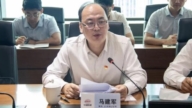【新唐人2011年10月24日讯】中国财政部近日宣布四个省市做为发行地方政府债券的试点。有专家认为,在中央和地方财政预算、支出不透明,缺乏监管和主体责任不明确的前提下,旧债未还又借新债可能会加剧“地方债”危机。更有网友指出:这个政策就是给了地方政府另外一把抢劫的枪。请看报导。
中国财政部17年来首次允许地方政府自行发债,从另外一面反应了地方财政危机已到白热化的边缘。截止到2010年底,中国地方政府债务总额达到10.7万亿元人民币,占中国银行借贷的80%。2011和2012年,地方政府集中偿还到期的债务高达4.6万亿元人民币。
海内外经济学者认为,中共政府为解决地方债务危机的应急措施,并不能解决实际问题。
英国剑桥大学经济学者张炜在接受BBC中文网的采访时表示,中共中央和地方财政没有理清,同时地方政府的财政也没有透明,再加上没有很好的得到立法机构和地方老百姓的监督,这种情况下推行地方债,可能会对中国老百姓产生危险。
英国《金融时报》也提出警告说,中国大陆地方政府的大部分借款无法偿还,恐怕给中国金融带来严重破坏。银监会官员也承认,地方政府融资平台存在管理不规范、监管机制缺失等重重风险隐患。
而财政部通知,明年四个试点由财政部代办还本付息,债券的偿还还是由中央负责。
经济学家茅于轼指出,政府信用不良,正是地方发债的风险所在。
茅于轼:“风险就是政府能不能可靠的还债啊,因为中国﹙共﹚政府不是信用很好的一个单位,(风险)也没法控制,因为政府不能打官司啊,别的企业可以跟他打官司,政府你跟他打官司你打的赢吗?谁监督政府啊,不像别的国家老百姓监督政府,我们这政府监督老百姓,老百姓不能监督政府的。”
茅于轼认为,中共在短时期内要完成所谓229亿元人民币的发债额度,可能性不大。
经济学家茅于轼:“所以我估计,这样一个地方政府债券对普通老百姓没有多大吸引力。我猜想,他只有一个办法,就是让国企去买债券,等于是一种摊派性质。可以拖一拖还债的问题,没有彻底解决问题。问题还在嘛、后果是出卖国有资产、这是一条路。”
公众对四省市将启动自行发债试点消息的也持批评态度,有网友在微博上质问:中国几大国有银行不是很有钱吗?为什么不肯贷款给地方政府?因为地方政府从来就没想过还钱。现在自行发债,只不过是变相为政府捐款而已。
还有网友说:为什么不大幅缩减“三公”支出?
知名博主五岳散人写道:通俗的说,这个政策就是给了地方政府另外一把抢劫的枪。
新唐人记者张丽娜、许旻、王明宇采访报导。
Local Bonds: A Repetitive Robbery Committed by the CCP
Chinese Ministry of Finance recently announced a pilot project.
Four selected provinces will issue local bonds.
Experts criticized that under the premise that
both central and local budgets are not transparent,
lack supervision,and have no clear purpose,
local debt crises will only worsen with new debts.
People also criticized, via the internet, that this pilot study is
just another gun issued to the local government for robbery.
The following is our report.
For the first time in 17 years, the Chinese Ministry of Finance
allowed local governments to issue bonds on their own.
This reflects that local financial crises have fiercely intensified.
Until the end of 2010, the Chinese local government debt
amounted to 10.7 trillion yuan, accounting for 80% of Chinese bank lending.
In 2011 and 2012, the total of due debt to be paid back by
local governments was as high as 4.6 trillion yuan.
Economists both internationally and domestically do not
believe this type of emergency plan will solve any practical
problems the local government is facing financially.
Economist at University of Cambridge, Zhang Wei, told BBC
that the CCP has a messy financial situation existing in both
central and local governments.
The financial system is not transparent and lacks supervision
from both the legislative level and the general public.
Under such a condition, the implementation of local debt
might be dangerous for the Chinese people.
As warned by British Financial Times, Beijing’s emergency
policy might have spurred growth,but simultaneously worsened bad debts.
China Banking Regulatory Commission officials also admitted
heavy risks exist in local financing platforms, such as irregular
management and lack of regulatory mechanisms.
According to the Ministry of Finance, the Treasury will pay
for the debts of the four selected local governments for next year,
and central government will repay the bonds.
Economist Mao Yushi indicated that bad government credit
is exactly the risk of local bonds.
Mao Yushi: " The risk is whether the government is
reliable at paying back the debt, after all Beijing government
does not have a good credit.
(Risk) can’t be controlled, because government can’t be sued.
Who is monitoring the government?
It’s not like other countries where people monitor them.
Here our government monitors the people,
people can’t (monitor) the government."
Mao Yushi does not believe CCP is likely to accomplish raising
a total combined quota of 22.9 billion yuan before the end of the year.
Translator’s note: see relevant article
Economist Mao Yushi : “So I believe such local
government bonds won’t appeal to the general public.
I guess, to have state-owned enterprises buy bonds, that is,
distribute the bonds as the only way is the nature of this project.
Delayed the problem of debt, not solved it completely.
The problem exits. The consequence is to sell state assets,
that is a way out."
Public opinion is also very critical of the CCP’s pilot project.
As seen on the website, people questioned, “Several
state-owned banks are quite wealthy.
Why wouldn’t they lend the money to the local government?
Because local government will never think of paying back.
The local bonds are only a disguise to ask for donation.
There are also people who questioned: Why not substantially
reduce the official expenses?
Well-known blogger Wuyui wrote: Quite frankly, this policy is
to serve the local government for allowing them another gun to commit a robbery.
NTD reporters Zhang Lina, Xu Min and Wang Mingyu




























